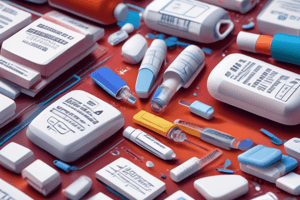Podcast
Questions and Answers
Which type of drugs is used to relieve pain by binding to opiate receptors in the CNS?
Which type of drugs is used to relieve pain by binding to opiate receptors in the CNS?
- Parasympathomimetics
- Sympathomimetics
- Stimulants
- Opioid agonists (correct)
Which class of drugs inhibits sodium influx into cells to treat seizures?
Which class of drugs inhibits sodium influx into cells to treat seizures?
- Anti-convulsants (correct)
- Stimulants
- Antidepressants
- Depressants
What is the primary mechanism by which psychotherapeutic drugs treat illnesses like schizophrenia and depression?
What is the primary mechanism by which psychotherapeutic drugs treat illnesses like schizophrenia and depression?
- Stimulating the CNS
- Inhibiting sodium influx
- Enhancing GABA activity
- Blocking dopamine receptors (correct)
Which group of medications affects cardiac tissue through potassium channel blockers?
Which group of medications affects cardiac tissue through potassium channel blockers?
What is the primary action of antiplatelet agents?
What is the primary action of antiplatelet agents?
What did the FDA replace the pregnancy drug category system with?
What did the FDA replace the pregnancy drug category system with?
How do immunosuppressant medications primarily work in the body?
How do immunosuppressant medications primarily work in the body?
What changes do young infants experience that affect their ability to process oral medications?
What changes do young infants experience that affect their ability to process oral medications?
In what situations should a delay in pharmacological treatments for pregnant patients be considered?
In what situations should a delay in pharmacological treatments for pregnant patients be considered?
What are the classifications based on for drugs according to the text?
What are the classifications based on for drugs according to the text?
What type of changes in pharmacokinetics do geriatric patients experience?
What type of changes in pharmacokinetics do geriatric patients experience?
Under which classifications are the nervous system drugs categorized?
Under which classifications are the nervous system drugs categorized?
Study Notes
- Before administering medications to pregnant patients, consider the potential risks to the fetus as changes in the pregnant woman's body can affect how drugs are processed.
- FDA replaced the pregnancy drug category system with a more detailed narrative summary system for prescribing information related to pregnancy and lactation risks.
- Delay in pharmacological treatments for pregnant patients should be considered unless in life-threatening situations; contact medical control for guidance if unsure.
- Young infants have reduced metabolic capacity due to incomplete GI tract development, affecting absorption and elimination of oral medications.
- Geriatric patients experience similar changes in pharmacokinetics as young children, with slowed hepatic function and GI activity.
- Advanced EMTs are legally, morally, and ethically responsible for each drug they administer, ensuring safe and effective drug administration following national guidelines.
- Drugs can be classified based on their effects on specific body parts or conditions, falling into categories like body agent, class of agent, and mechanism of action.
- Nervous system classifications include the CNS, peripheral nervous system, and autonomic nervous system (ANS) divided into sympathetic and parasympathetic systems.
- Medications affecting the nervous system include sympathomimetics (mimic sympathetic effects), sympatholytics (inhibit sympathetic effects), parasympathomimetics (mimic parasympathetic effects), and parasympatholytics (block parasympathetic effects).
- Analgesics relieve pain, with opioid agonists binding to opiate receptors in the CNS to prevent pain signals; non-opioid agonists may have additional properties like reducing fever.
- Sedative drugs induce sedation and hypnosis, including benzodiazepines, barbiturates, and opioids.
- Anti-convulsants inhibit sodium influx into cells to treat seizures; stimulants like caffeine and amphetamines excite the central nervous system.
- Depressants slow brain activity, treating conditions like anxiety and insomnia; psychotherapeutic drugs block dopamine receptors in the brain to treat illnesses like schizophrenia and depression.
- Cardiovascular system drugs are classified based on effects like chronotropic (heart rate), inotropic (force of contraction), and dromotropic (conduction velocity).
- Anti-arrhythmic medications affect cardiac tissue through sodium channel blockers, beta blockers, potassium channel blockers, and calcium channel blockers.
- Anti-hypertensive medications lower blood pressure through diuretics, vasodilators, sympathetic blocking agents, ACE inhibitors, and calcium channel blockers.
- Antiplatelet agents interfere with platelet aggregation, while anticoagulant drugs prevent blood clot formation; fibrinolytic agents dissolve thrombi.
- Oxygen is commonly used in the prehospital setting but has appropriate and inappropriate uses with potential side effects; antihistamines are used during allergy season but can be overdosed.
- Drugs affecting the pancreas include hypoglycemic medications that act directly on the pancreas or alter insulin utilization in the body.
- Immunosuppressant medications inhibit the body's immune response, prescribed for organ transplant patients or those with autoimmune diseases to prevent attacks on foreign organs or self.
Studying That Suits You
Use AI to generate personalized quizzes and flashcards to suit your learning preferences.
Description
Test your knowledge of pharmacological considerations in emergency medical services, including drug administration to pregnant patients, pediatric and geriatric patients, nervous system classifications, cardiovascular drugs, and medications affecting the pancreas and immune system.




